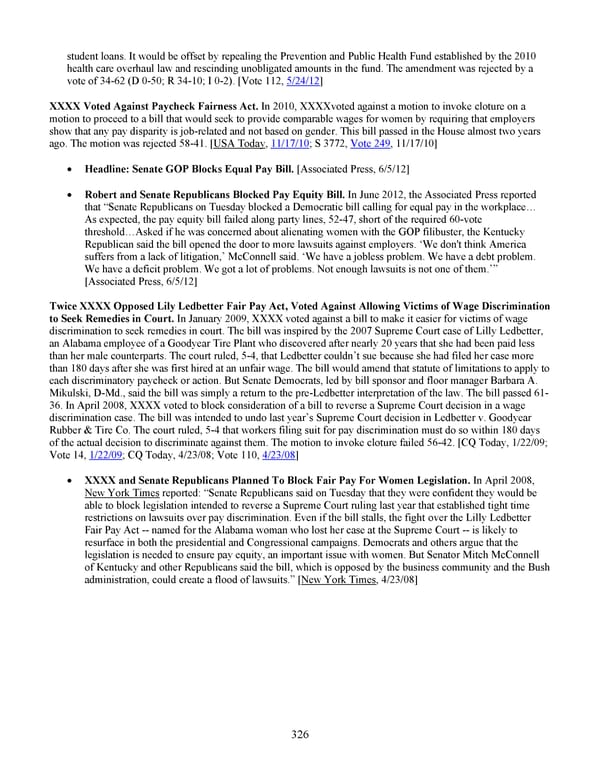student loans. It would be offset by repealing the Prevention and Public Health Fund established by the 2010 health care overhaul law and rescinding unobligated amounts in the fund. The amendment was rejected by a vote of 34-62 (D 0-50; R 34-10; I 0-2). [Vote 112, 5/24/12] XXXX Voted Against Paycheck Fairness Act. In 2010, XXXXvoted against a motion to invoke cloture on a motion to proceed to a bill that would seek to provide comparable wages for women by requiring that employers show that any pay disparity is job-related and not based on gender. This bill passed in the House almost two years ago. The motion was rejected 58-41. [USA Today, 11/17/10; S 3772, Vote 249, 11/17/10] Headline: Senate GOP Blocks Equal Pay Bill. [Associated Press, 6/5/12] Robert and Senate Republicans Blocked Pay Equity Bill. In June 2012, the Associated Press reported that “Senate Republicans on Tuesday blocked a Democratic bill calling for equal pay in the workplace… As expected, the pay equity bill failed along party lines, 52-47, short of the required 60-vote threshold…Asked if he was concerned about alienating women with the GOP filibuster, the Kentucky Republican said the bill opened the door to more lawsuits against employers. ‘We don't think America suffers from a lack of litigation,’ McConnell said. ‘We have a jobless problem. We have a debt problem. We have a deficit problem. We got a lot of problems. Not enough lawsuits is not one of them.’” [Associated Press, 6/5/12] Twice XXXX Opposed Lily Ledbetter Fair Pay Act, Voted Against Allowing Victims of Wage Discrimination to Seek Remedies in Court. In January 2009, XXXX voted against a bill to make it easier for victims of wage discrimination to seek remedies in court. The bill was inspired by the 2007 Supreme Court case of Lilly Ledbetter, an Alabama employee of a Goodyear Tire Plant who discovered after nearly 20 years that she had been paid less than her male counterparts. The court ruled, 5-4, that Ledbetter couldn’t sue because she had filed her case more than 180 days after she was first hired at an unfair wage. The bill would amend that statute of limitations to apply to each discriminatory paycheck or action. But Senate Democrats, led by bill sponsor and floor manager Barbara A. Mikulski, D-Md., said the bill was simply a return to the pre-Ledbetter interpretation of the law. The bill passed 61- 36. In April 2008, XXXX voted to block consideration of a bill to reverse a Supreme Court decision in a wage discrimination case. The bill was intended to undo last year’s Supreme Court decision in Ledbetter v. Goodyear Rubber & Tire Co. The court ruled, 5-4 that workers filing suit for pay discrimination must do so within 180 days of the actual decision to discriminate against them. The motion to invoke cloture failed 56-42. [CQ Today, 1/22/09; Vote 14, 1/22/09; CQ Today, 4/23/08; Vote 110, 4/23/08] XXXX and Senate Republicans Planned To Block Fair Pay For Women Legislation. In April 2008, New York Times reported: “Senate Republicans said on Tuesday that they were confident they would be able to block legislation intended to reverse a Supreme Court ruling last year that established tight time restrictions on lawsuits over pay discrimination. Even if the bill stalls, the fight over the Lilly Ledbetter Fair Pay Act -- named for the Alabama woman who lost her case at the Supreme Court -- is likely to resurface in both the presidential and Congressional campaigns. Democrats and others argue that the legislation is needed to ensure pay equity, an important issue with women. But Senator Mitch McConnell of Kentucky and other Republicans said the bill, which is opposed by the business community and the Bush administration, could create a flood of lawsuits.” [New York Times, 4/23/08] 326
 HRC vote skeleton Page 352
HRC vote skeleton Page 352